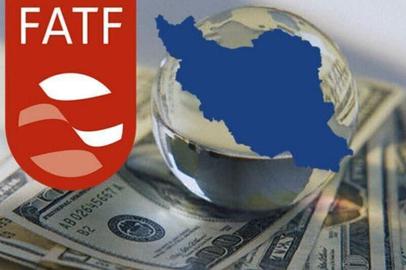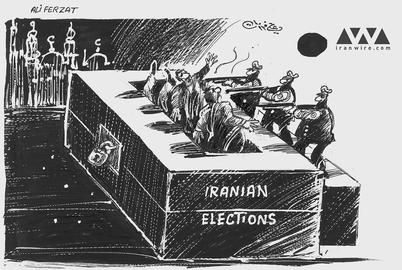After granting the country long and repeated reprieves, the Financial Action Task Force (FATF) has finally returned Iran to its blacklist, alongside North Korea.
In its last fateful ultimatum to Iran, the FATF had demanded that, to avoid the blacklist, Iran must implement the International Convention for the Suppression of the Financing of Terrorism (CFT) and the Convention against Transnational Organized Crime as its own domestic laws. The task force removed Iran from the blacklist for a short while after it signed the nuclear treaty, when Iran’s prospects appeared to be improving, but now it is back on the list.
Parliament approved moves to join both conventions in 2018, but for more than a year the Guardian Council and the Expediency Council prevented the implementation of the conventions until the last moratorium expired. Now the FATF has taken action, and its addition of Iran to the list means that any financial transaction with the country must be carefully examined to ward off potential involvement in money laundering, or financial support for terrorism and drug trafficking.
In its February 21 public statement announcing its decision to place Iran on its blacklist, the FATF warns: “High-risk jurisdictions [countries] have significant strategic deficiencies in their regimes to counter money laundering, terrorist financing, and financing of proliferation. For all countries identified as high-risk, the FATF calls on all members and urges all jurisdictions to apply enhanced due diligence, and in the most serious cases, countries are called upon to apply counter-measures to protect the international financial system from the ongoing money laundering, terrorist financing, and proliferation financing.”
When a country is put on the FATF list, it means that country has failed to fully and effectively implement the task force’s guidelines for strengthening its financial system against money laundering. When the FATF issues such a warning, member countries or countries that follow its guidelines reconsider their financial dealings with the “high-risk jurisdiction” and even if they do not cut off their dealings completely, they become very careful about them so that they themselves will not be accused of money laundering.
The FATF describes money laundering as follows: “The goal of a large number of criminal acts is to generate a profit for the individual or group that carries out the act. Money laundering is the processing of these criminal proceeds to disguise their illegal origin. This process is of critical importance, as it enables the criminal to enjoy these profits without jeopardizing their source.
“Illegal arms sales, smuggling, and the activities of organized crime, including for example drug trafficking and prostitution rings, can generate huge amounts of proceeds. Embezzlement, insider trading, bribery and computer fraud schemes can also produce large profits and create the incentive to ‘legitimize’ the ill-gotten gains through money laundering.”
Money Laundering in the Service of Bribery
A good example of how bribery can be covered up by money laundering was provided by Fazel Larijani, brother of Ali Larijani, Speaker of the Iranian Parliament, and Sadegh Larijani, Chairman of the Expediency Council. He proposed to Saeed Mortazavi, the notorious former prosecutor, that if he paid him a bribe he would help him to solve his legal problems using the influence of his brothers. The bribe he asked for was a 600-square meter apartment, but he asked for the deed to be registered in the name of the dead father of an acquaintance so that “it would not be noticed.” In other words, Fazel Larijani wanted to hide his illegal proceeds by laundering the money.
The Islamic Republic financially supports groups such as Lebanese Hezbollah and paramilitary groups in the region such as the Houthis in Yemen, and Iranian officials are worried that if they accept the FATF’s rules they will not be able to continue supporting these groups.
At the moment, as a result of wide-ranging American sanctions and other sanctions imposed by the European Union for violations of human rights and for supporting terrorism, Iran has very limited banking relations at the international level, and what relations it does have are mainly with Turkish, Chinese and Russian banks. But with the warning issued by the Financial Action Task Force, banks that conduct transactions with the Islamic Republic before February 21 are bound to reconsider their relations with Iran. If they do not, the FATF might add them to the list of “high-risk jurisdictions,” costing the banks and other financial institutions their reputation and credibility.
As a result, the consequences of the FATF’s action will soon be felt in Iran’s economy, and in its international financial relations.
It is now up to the Supreme Leader Ayatollah Khamenei to approve the two conventions — the International Convention for the Suppression of the Financing of Terrorism and the Convention against Transnational Organized Crime — so that Iran can once again enjoy normal financial relationships. If Khamenei decides to do so, it must be publicly announced, either directly by him or, as he usually decides to do, indirectly, by sending the proposals back to the Expediency Council for approval.
However, even if Iran officially joins these two conventions, it will not be automatically removed from the blacklist. Iranian representatives must then convince the FATF’s members to vote “yes” in its next meeting.
Countries on FATF’s blacklist lose many economic and financial benefits in their international dealings and their standing in the international community is damaged because they are viewed as irresponsible outlaws vis-à-vis international rules and regulations for fighting money laundering.
Related Coverage:
Money-Laundering is the Essence of the Revolutionary Guards' Financial Activities, 7 November 2019
Expediency Council: A Tool to Bypass Laws, 16 March 2019
The Cost of Iran’s Stubborn Refusal to Join International Treaties, 5 November 2018
Iran Finally Signs Convention for the Suppression of the Financing of Terrorism, 8 October 2018
Our Economy is Corrupt to the Core. No, It’s Even Worse!, 27 August 2018
Money Laundering and Terrorism: Rouhani vs the Revolutionary Guards, 7 September 2016
visit the accountability section
In this section of Iran Wire, you can contact the officials and launch your campaign for various problems

























comments